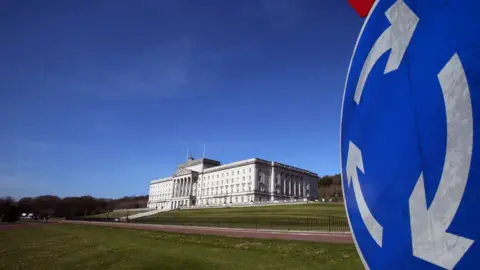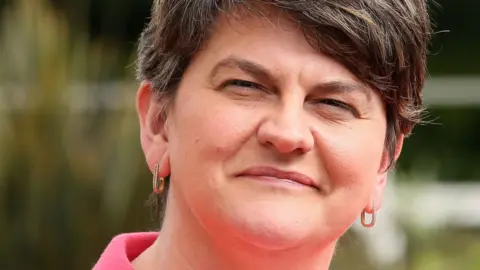Northern Ireland: A year without devolved government
 Getty Images
Getty ImagesIt is a year since devolved government in Northern Ireland collapsed. But how has the lack of a Northern Ireland Executive and assembly affected life there, and what do people want from the future?
It seemed a little late to be talking about Christmas, but Aiden Flynn remained focused on the celebrations just passed. The managing director of a large construction company based just outside Belfast, he said he kept thinking about the 40 members of staff he had had to lay off last year.
"That's 40 families who didn't have a great Christmas," he said. "And it's going to get worse, unless the assembly gets back to doing its work."
The assembly he referred to was set up in Northern Ireland after the Good Friday peace agreement. It took on a host of legislative responsibilities, from economic development, to education and health. But more than anything, the assembly was supposed to bring together republicans and unionists in a project of common purpose.
One year ago, however, that sense of common purpose seemed to vanish, as the republican party, Sinn Fein, walked out on the assembly, bringing about its collapse. Since then, there's been no authority to commission the kind of public sector work upon which Mr Flynn's construction company and many others in Northern Ireland depend.
 Getty Images
Getty Images"I would normally get a constant stream of work: refurbishment of schools… of hospital wards. I was hopeful they'd get the assembly up and running again 11 months ago - but 12 months?"
The ostensible reason for Stormont's collapse was financial: the ruling Democratic Unionist Party (DUP) was blamed for the failure of a renewable heating scheme. Demands for the DUP leader, Arlene Foster, to resign went unheeded, but that demand has now been dwarfed by a whole list of requirements issued by Sinn Fein to be met before it will return to shared power.
At The Maverick, a gay and lesbian bar in Belfast, I found customers mulling over one of these: that the DUP agrees to allow same-sex marriage, still illegal in Northern Ireland.
"It's great that one of the main parties is supporting equal marriage," one drinker told me. He said it might make him more likely to vote for Sinn Fein.
But another was more cynical: "I can't help thinking that Sinn Fein has picked it up because it's something the DUP oppose. They're just using it as a means of contradicting them."
Such political opportunism would hardly be unique, indeed it has become almost expected in an era of widespread cynicism.
However, the writer Malachi O'Doherty believes there is particular reason to doubt the face-value demands of Northern Ireland's parties. Put quite simply, he sees more long-term political and sectarian divisions lurking underneath.
"Sinn Fein and the DUP have locked horns like old rams familiar with the struggle with each other," he says.
"We've been through a period where we had some optimism divisions would be dispelled.
"Now, the more contempt you express for the other side, the more votes you will get."
 Getty Images
Getty ImagesNot so, insists Simon Hamilton, a DUP member of the legislative assembly.
He says: "We want to see the institutions up and running again immediately, but Sinn Fein have developed a fairly lengthy shopping list of demands."
He mentions the call for an Irish language act, which would give Irish heightened official status in Northern Ireland. Mr Hamilton worries this will lead to fluency in Irish becoming a requirement for some official jobs.
Moreover, he says, if Sinn Fein wants a language act, equal marriage, or any other measure, it should agree to re-establish the assembly, and then use it as a forum to press its demands.
But Mairtin O Muilleoir is not in a mood to go back without guarantees. A Sinn Fein member of the legislative assembly, he dismisses its previous incarnation as being "founded on arrogance and disrespect".
The late Martin McGuiness, then Deputy First Minister, was right to bring the assembly down, Mr O Muilleoir says. And he insists that same-sex marriage and enhanced Irish language status are fundamental to Sinn Fein's politics, adding: "Republicanism was founded on the basis of equality for all."
 Getty Images
Getty ImagesIt is exactly the kind of political-historic discussion that leaves Dr John Woods looking weary. Dr Woods chairs the British Medical Association in Northern Ireland, where four of the five health trusts are among the 10 worst emergency department performers in the UK.
Yet plans for local NHS provision are now gathering dust, with no assembly to implement them.
"We very definitely want the assembly up and running… to take the necessary decisions," Dr Woods says. "In the absence of that, we will simply carry on with a system that is failing."
This week sees a new Northern Ireland secretary appointed. The previous one, James Brokenshire, had to set a budget for Northern Ireland, in the absence of an elected assembly. But his replacement, Karen Bradley, may yet impose full direct rule from Westminster, if power sharing cannot be restored.
And the assembly's headquarters at Stormont will become an over-sized, underused monument to thwarted hopes of the recent past.
